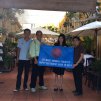Find your tours
Planning a trip today can be confusing and time consuming. MinMax Travel not only arranges the various modes of transportation, but also may be able to save you money with early booking discounts, special fares, hotel deals and travel advisories. Don't take our word for it. See what the previous customer has to say about MinMax Travel.
Read about Our Service
Why book
with us ?
with us ?
What people say about Minmax travel ?
Thank you for your organizing our holiday. We enjoyed this trip so much!


